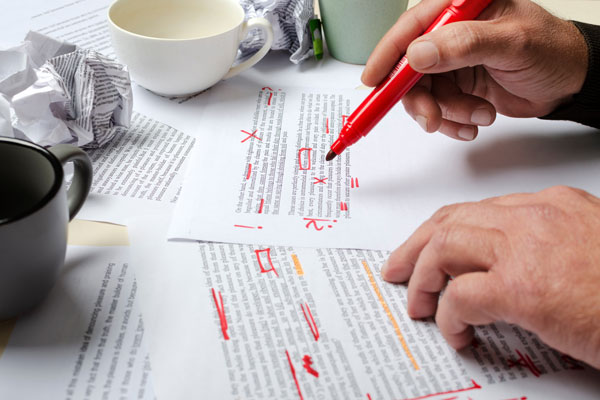
Ruthless Editing: An Objective Look at Your Writing
Some writers struggle to step away from their writing to edit their work objectively.
By David Cox
Ruthless editing involves refining your writing until it shines. Yet, cutting words, revising sentences, and deleting beloved paragraphs feels painful. So, ruthless editing may involve prioritizing aspects of clarity, brevity, and reader engagement.
Why Ruthless Editing Matters
#1. Improves Clarity
Run-on sentences and unnecessary details dilute your message. Ruthless editing ensures your ideas are clear and easy to follow.
Original: “The weather that day, while unpredictable, turned out to be better than expected, though it was still not ideal.”
Edited: “The weather was better than expected, but not ideal.”
#2. Strengthens Your Voice
Edit to cut redundancies and clutter. Allow your unique style to stand out. A concise writer is often perceived as confident and authoritative.
#3. Boosts Professionalism
Errors, inconsistencies, and rambling sentences can undermine your credibility. Ruthless editing helps you polish your work to a professional standard.
How to Edit Ruthlessly
#1. Take a Break
Distance yourself from your draft for a few hours or even days. This fresh perspective makes spotting unnecessary words, awkward phrasing, and weak arguments easier.
#2. Cut Without Mercy
Be prepared to delete sentences, paragraphs, or sections that don’t serve your purpose. Ask yourself:
- Does this text add value to my piece?
- Will the reader miss this text if it’s gone?
Here’s a tip: Save deleted sections in a separate file. You might repurpose them later for another project.
#3. Prioritize Active Voice
Sentences written in passive voice are often considered weak. They can obscure the sentence’s subject. They can also create unnecessary complexity and make writing less engaging.
Example: The report on quarterly sales was written by the team.
Active voice is generally stronger because it creates clear, concise, engaging sentences. These sentences emphasize the subject and action.
Edited: “The team wrote the quarterly sales report.”
#4. Get Rid of Redundancies
Redundant phrases waste space and weaken your writing. Here are examples of alternatives to common redundancies:
- “gift” instead of “free gift.”
- “result” instead of “end result.”
- “I think” instead of “in my opinion, I think.”
#5. Watch for Weak Words
In editing, a filler word is a word or phrase that adds little to no meaning, clarity, or value to a sentence. Examples of such words include:
- Adverbs: very, really, actually, basically, literally
- Phrases: in order to, due to the fact that, for all intents and purposes
- Unnecessary Modifiers: kind of, sort of, somewhat, a little
Original: “She really didn’t know what to do next.”
Edited: “She didn’t know what to do next.”
#6. Read Aloud
Reading your work aloud reveals clunky sentences, repetitive words, and unnatural phrasing. If a sentence sounds awkward, rework it.
#7. Ask for Feedback
A trusted friend or editor can provide valuable insights. Sometimes, others spot weaknesses you’ve overlooked.
#8. Focus on Your Purpose
Every sentence should contribute to your central message. If it doesn’t, it has to go. Ask: Does this sentence advance my argument, clarify a point, or engage the reader? If not, delete it.
#9. Break the Rules When Necessary
Ruthless editing encourages deleting unnecessary words. But don’t sacrifice your voice or creativity for brevity. A well-placed anecdote or descriptive passage can enhance your work.
A Mindset for Ruthless Editing
- Think of editing as a creative act. It isn’t about destruction. It’s about shaping your draft into its best form.
- Separate the writer from the editor. Writing is an emotional process. But editing demands objectivity. Remind yourself that cutting words doesn’t diminish your talent. It elevates your work.
- Value the results of your efforts. Ruthless editing leads to concise, focused, and more impactful writing. Celebrate the improvement, even if the process feels challenging.
Presenting Your Best Work
Editing is a skill that separates good writers from great ones. It requires discipline, objectivity, and a commitment to delivering your best work. You can create writing that stands out and resonates. Cut unnecessary words, focus on clarity, and keep your audience in mind.
So, the next time you face another first draft, embrace the art of ruthless editing. It’s your ticket to writing that truly shines.

